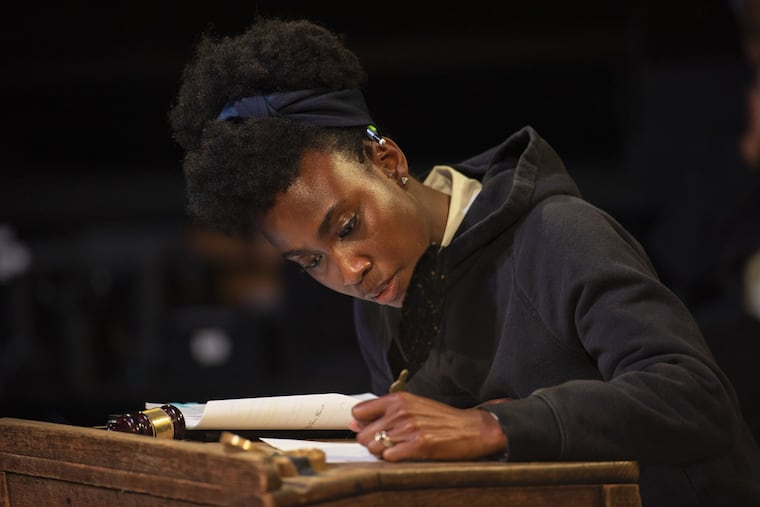Phillis Wheatley was a young, enslaved poet in the 1700s. A new play tells the story of her life.
'Written by Phillis,' is a world premiere being staged at the Sedgwick Theatre in Mt. Airy. Paul Oakley Stovall, who played George Washington in "Hamilton" is a cowriter.

When actors play characters — especially historical ones — for a long time, “after the first nine months or so, you go down into the rabbit hole of your character’s life,” said playwright Paul Oakley Stovall. Stovall played George Washington in the Hamilton touring company, including during its 2019 stop here.
On his rabbit hole voyage, Stovall encountered the writings of a Black poet greatly admired by Washington and ended up collaborating on a play about her — Written by Phillis, a world premiere being staged at Quintessence Theatre Group’s Sedgwick Theater in Mount Airy.
Phillis Wheatley was a formerly enslaved woman who garnered worldwide praise for her poetry during Washington’s time.
Written by Phillis is a cooperative effort with Stovall and Marilyn Campbell-Lowe as co-playwrights and Cheryl Lynn Bruce as the director, but Wheatley’s role as collaborator cannot be left out. The words from her poems and letters form the basis for much of the dialogue in the play that moves from the colonial era and catches up to the present time.
“She was the most celebrated African woman in the world,” Bruce said.
While little is known about her early life, scholars believe she was born in Gambia around 1753, arriving in Boston at age 7 aboard a ship named Phillis, hence the name given to her by John and Susanna Wheatley. They bought her to serve Susanna Wheatley.
Phillis Wheatley was taught to read and write, and her talent with language soon became evident. Susanna Wheatley and a friend, the Countess of Huntingdon, arranged for her to travel to London and, in 1773, had her poems published in a book, which received positive reviews.
The cover reads Poems on Various Subjects, Religious and Moral by Phillis Wheatley, Negro Servant to Mr. John Wheatley of Boston, in New England.
Last week, a first edition of her book was auctioned for $38,175.
“During the ‘60s and the ‘70s, [Wheatley] was criticized by some Black activists because she did not forcefully write against slavery,” Bruce said.
“What would you have done had you been kidnapped at the age of 7 and then shown such kindness after a 16-week journey in the hull of a ship?” Stovall asked. “I don’t judge Phillis in any way. You have to sit back and say nothing, or if you are saying something, ‘There but for the grace of God go I.’”
Despite the basis of their relationship, Bruce said, it was clear that Susanna Wheatley and Phillis Wheatley had a genuine love for each other — an important part of the play.
In 1770, Phillis Wheatley penned “An Elegiac Poem, on the Death of That Celebrated Divine … George Whitefield.”
Whitefield, a popular preacher and a friend of Benjamin Franklin’s, campaigned against mistreating enslaved people. But that did not stop him from having enslaved people working on his plantation or from advocating for the use of slavery. With all the wealth he accumulated as a plantation owner and slaveholder, Whitefield financed orphanages.
In Philadelphia, Whitefield sold Franklin a building that was a predecessor school to the University of Pennsylvania. For years, a statue of Whitefield held a place of honor on Penn’s campus until it was removed in 2020. In the play, an actor playing a graduate student addresses that part of the story.
The Rosenbach Museum (2008-2010 Delancey Place, Phila.) has original copies of Phillis Wheatley’s work available for public viewing, and the Museum of the American Revolution’s collection (101 S. 3rd St., Phila.) includes one of her letters, written in 1774, that repudiates slavery and defends human equality.
“Written by Phillis,” Quintessence Theatre Co. in collaboration with the New Classic Collective in Chicago, May 10-June 4 at the Sedgwick Theater, 7137 Germantown Ave., Phila. 215-978-4450 or quintessencetheatre.org
Check with the theater for COVID-19 protocols.